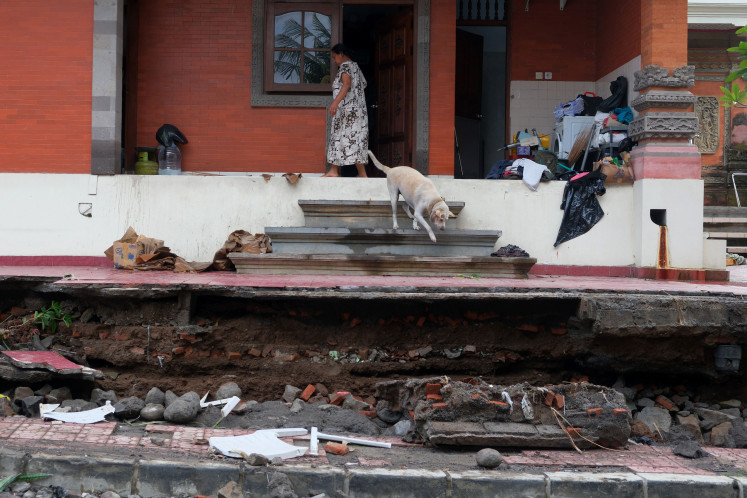Popular Reads
Top Results
Can't find what you're looking for?
View all search resultsPopular Reads
Top Results
Can't find what you're looking for?
View all search resultsJakartans struggle to cope with city's air pollution
Despite its poor air quality, many people living in Jakarta choose â or perhaps have no choice â to stay in the capital
Change text size
Gift Premium Articles
to Anyone
D
espite its poor air quality, many people living in Jakarta choose ' or perhaps have no choice ' to stay in the capital.
After leaving Jakarta for Bali for about a year for work, Devi Agustina, who moved back to the capital earlier this year, could not ignore the deteriorating quality of the air in Jakarta. 'After living in a place like Bali, you realize how much you lose while living in Jakarta,' she told The Jakarta Post recently. 'I miss Bali's blue skies every time I see Jakarta's polluted air.'
Quin Robert, an Australian student who regularly visits Jakarta to do his research, notices the difference between the air qualities in Jakarta and other cities he usually visits.
'When seeing Jakarta's sky upon my arrival, I thought it was going to rain or it was fog [..] but then I realized I was in Jakarta and that must be pollution,' he said, adding that he always tried to avoid being outdoors for too long.
Devi says she has no choice but to survive Jakarta's poor air quality.
'I did try using masks while moving around the city like many people here in Jakarta, but I couldn't really breathe normally. I try not to be outdoors when not necessary. I also wash my face and clean my nose using wet tissues frequently,' she said.
Damayanti Sucipto from the Ear, Nose and Throat Specialists Association (Perhati-KL) said that wearing masks would help city residents reduce the impact of air pollution.
'Masks help filter bacteria and dust. They won't totally protect us but we can always rely on medical masks,' she told the Post, adding that nasal rinsing was also helpful.
Jakarta is among the megacities of the world whose air pollutants exceed WHO health protection guidelines.
According to the WHO's air quality guidelines released in 2006, the particulate matter (PM10) parameter should not exceed 50 g/m3 in 24 hours and remain below 100 ug/m3 for eight hours for the Ozone (O3) parameter.
A report by the Community for Leaded Gasoline Eradication (KPBB) in July last year indicated that air pollution in the capital was relatively high in particulate parameters.
For Jakarta, the city administration has set 150 ug/m3 for the PM10 parameter. Although the pollution levels in the city are low in certain areas as per the agency's standard, other areas slightly exceed the WHO guideline numbers.
The current administration of Governor Joko 'Jokowi' Widodo is keen to add more green spaces in the capital. The governor has promised to increase green spaces during his first five-year term from its current level of 10 percent to at least 20 percent of the city's 662-square-kilometer area.
Mukri Friatna of the Indonesian Forum for the Environment (Walhi) said that motor vehicles were to blame for the worsening air quality in the capital.
'Emissions from motor vehicles contribute 70 percent to air quality degradation, the highest factor compared to other emission producers such as factories, airplanes and households,' he said. Mukri said that at least 5 million vehicles used Jakarta's streets every day.
He called on the city administration to evaluate the maximum amount of emissions that could be released into the air.
'Bylaws set it at 0.5 ppm [part per million] in 2011. It's time to reduce that,' he said, adding that the administration should also evaluate the capital's current environmental capacity.
Mukri pointed out that city could not rely on the Environmental Management Agency (BPLHD) alone to improve the environment quality.
'It is an effort which should involve the city administration and the Jakarta Legislative Council because recommendations [from the agency] will mean nothing if they aren't followed by legally binding regulations,' he said.










